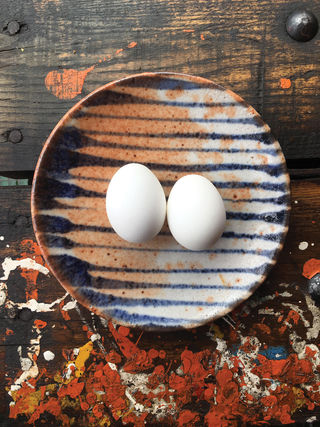He Knows What You Really Need
Glenn Adamson has spent his career studying and curating well-crafted objects. Now he explains why we should bring that same ethos and appreciation into our own homes.
By Gary Drevitch published July 2, 2018 - last reviewed on September 3, 2018

When Glenn Adamson speaks to a large group, he likes to ask audience members if they can explain how, and from what materials, the chairs they're sitting in were made. Most can't. It's not just modern industrial processes that elude us, though; few people can accurately explain how a handmade vase, box, or book is created either. The pronounced and growing ignorance of the provenance of our possessions, and the cultural embrace of cheap, disposable items over well-crafted objects, are among the subjects of Adamson's new book, Fewer, Better Things. In it, the design scholar and former director of the Museum of Arts and Design in New York makes a powerful case for limiting our purchases to things (including food) that we find to be beautiful, meaningful, or useful. It's a goal that he believes will lead us to lives of greater warmth and satisfaction, and, on a societal scale, promote respect and social cohesion.
Why is it important that we know how things are made?
It connects us to the world and everybody in it. Once upon a time, people knew how the things around them were made because they did it themselves or knew the people who did. Now, things come to us from a great distance and are created in situations that we are totally ignorant of. It's not an insuperable challenge: You can still find out how the objects in your life are made, but it's very difficult.
Is this at some level a green goal as well?
If you have a strong relationship to an object and curiosity about how it came to be, that might make you more curious about the materials it was made from and what environmental impact they might have.
That's a hard enough challenge when you're talking about a chair. It's nearly impossible for most people to describe how smartphones are assembled.
These devices present themselves as portals of understanding and knowledge—and yet we are totally uninformed about the objects themselves. In addition, the digital access that they give us is very different from, and in many ways thinner than, the kind of access we have to an object through an analog mode of curiosity.
So our phones contribute to our ignorance of craft?
Digital technology and craft are not incompatible: You can learn how to make a pot on YouTube, and many craftspeople are more successful financially because they sell work online. I'm not antitechnology, but I think it's important to remind ourselves of what technology may be making invisible or encouraging us to forget. Use your phone to get yourself to the workshop of a wonderful maker and find out what he or she does.
It doesn't help that people now refer to noninteractive objects as "dumb."
It's the natural implication of having "smart" technology: All the old stuff is dumb. The point I would make is that these "analog" objects, to use a neutral term, are repositories of generations and centuries of human knowledge, experimentation, and discovery. For example, to get all the materials into your table was difficult. But if you take that for granted, you're missing 99 percent of what we have been able to achieve as people and effectively cutting yourself off from that history.
Why might one become more attached to a well-designed chair than a well-designed phone?
Analog objects only do one thing, and they do it very well: A chair is for sitting. And there is so much richness in that relationship between the body and the chair that an iPhone can't give you. It doesn't even try.
Does the decline of shop classes in school keep people from having an entry into what craft means?
Absolutely. I'm not saying you should learn how to make everything before you buy it. I'm saying you should learn what it is to make something and have a feeling of what is involved. If you know how to make a simple wooden box, that's going to change your relationship to everything else, because you'll realize that every object had to go through that kind of process.
Can we reverse the trend?
The drive to get everybody computer-literate understandably knocked out a lot of those shop classes, and that's a bad thing. The association of vocational education with working-class identity, and the idea that it puts you at a certain level in the economic structure, is also pernicious.
You write that objects can deliver social cohesion. How?
A crafted object that you value ties you in a condition of respect to the person who made it. If you respect the object, it's likely that you're going to respect the maker as well. This is not about expensive or luxury items: What is a good object is up to you. It could be something your friend made, or that you made yourself, or something you found in an antique store that you just think is cool.

With cheap, easily consumable goods so available today, it seems our homes fill up with things we want to get rid of.
The way to react to the object glut is the same way you react to the junk food glut: I realize I can have that and I can afford it, but that doesn't necessarily mean it's good for me. It's not just a matter of restraint; it's a matter of having a positive relationship to that one thing instead of banal relationships with hundreds of things. Again, it's like food: Eat less but eat something you prepared carefully, that you love. It's really satisfying, and maybe there is also a narrative in your head about it.
Do people involved in creative but nonmaterial pursuits, such as computer coding, have more appreciation and respect for craft?
I think it's the reverse: People involved in technology or medicine or law or anything that's nonmaterial would be better at their jobs if they also had a creative pursuit. Nobel-winning scientists are much more likely than scientists in general to play music, have a craft hobby, or make art. That surely is not coincidental. Creativity is unlocked by material engagement—that hands-on, analog thing that you just can't get if your whole life is numbers and words.
How are your own craft skills?
I'm not particularly handy, but because of my career I have the opportunity to visit people in making spaces and see how they do their work. I'm not saying everybody should drop what they're doing and be a craftsperson, but it is possible to generate that kind of awareness by looking and wondering, visiting workshops, asking questions, and being interested.
In the past, we held onto things to pass down as heirlooms. Today, neither descendants nor consumers seem to want our old stuff.
Until the last 20 or 30 years, no generation faced the problem of their parents' things being worthless. You invested in textiles, furniture, and ceramics—the wealth being handed over to children. Suddenly those investments are valueless. It's the flip side of what I talk about with respect to material intelligence. If you don't care about how something came into the world, you're likely not to understand why it's worthy of respect and why you'd want to have it. But it's not just an heirloom you're refusing; you literally lose continuity with your familial past, and that's much more your failing than the object's.
Discovering how much goes into making even everyday objects is also humbling.
If you inherit some amazing chair that was made in the 1920s, it's easy to say, "Well, who cares? It's out of fashion." But if you try to make one, you see: "My god, look what went into that; I could never do it." It's a positive feeling of inadequacy to look at an object and think, I could not make that. You should have a sense of wonder about that.
Do you live your ethos of fewer, better things?

My partner and I—she's a painter—just bought a house. For us, it was not going to be uncomplicated to pick a place or decorate it. I want every object that passes through the door to deserve to be in the house, not because it's expensive but because it makes sense. I want to know where it came from, I want to know who made it, and ideally to have met them. I'm trying to use this opportunity to live according to walk-the-walk.
And it's worth the effort?
We have a dog, and that is not efficient; there is a lot of frustration. And yet people have dogs because it gives them so much back. Our culture has not forgotten why you'd want to have a dog, but I feel that it has forgotten why you would want to have well-made things in your life. That's something we have to get back in touch with.
